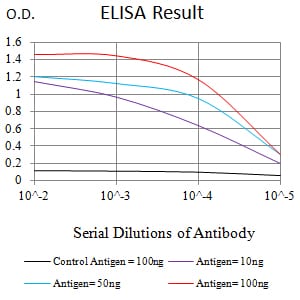

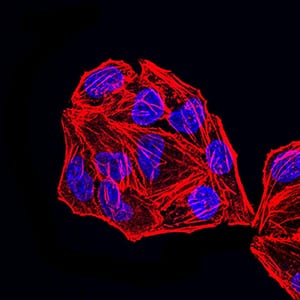
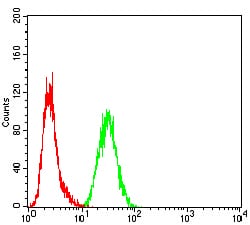

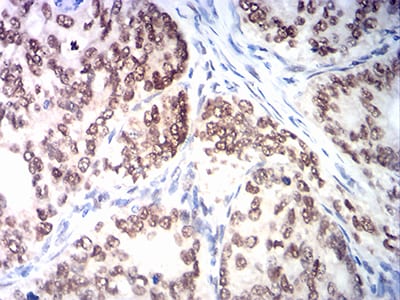
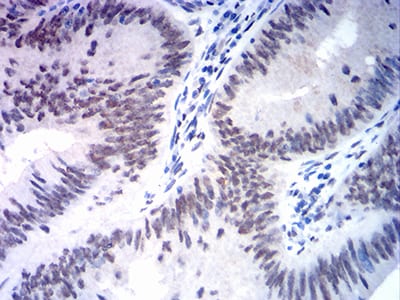
| WB | 1/500 - 1/2000 | Human,Mouse,Rat |
| IF | 咨询技术 | Human,Mouse,Rat |
| IHC | 1/200 - 1/1000 | Human,Mouse,Rat |
| ICC | 1/200 - 1/1000 | Human,Mouse,Rat |
| FCM | 1/200 - 1/400 | Human,Mouse,Rat |
| Elisa | 1/10000 | Human,Mouse,Rat |
| Aliases | FCC1; COCA1; HNPCC; LCFS2; hMSH2; HNPCC1 |
| Entrez GeneID | 4436 |
| clone | 2E2C7 |
| WB Predicted band size | 104.7kDa |
| Host/Isotype | Mouse IgG1 |
| Antibody Type | Primary antibody |
| Storage | Store at 4°C short term. Aliquot and store at -20°C long term. Avoid freeze/thaw cycles. |
| Species Reactivity | Human, Mouse |
| Immunogen | Purified recombinant fragment of human MSH2 (AA: 442-586) expressed in E. Coli. |
| Formulation | Purified antibody in PBS with 0.05% sodium azide |
+ +
以下是关于MSH2抗体的3篇参考文献的简要概括:
1. **"A National Cancer Institute Workshop on Microsatellite Instability for Cancer Detection and Familial Predisposition: Development of International Criteria for Determination"**
- **作者**: Boland, C.R. et al.
- **摘要**: 该研究提出了基于免疫组化(IHC)检测错配修复蛋白(包括MSH2抗体)的标准方法,用于筛查结直肠癌中的微卫星不稳定性(MSI),并指导林奇综合征的遗传风险评估。
2. **"Immunohistochemistry versus Microsatellite Instability Testing for Screening Colorectal Cancer Patients at Risk for Hereditary Nonpolyposis Colorectal Cancer"**
- **作者**: Shia, J. et al.
- **摘要**: 研究比较了MSH2抗体等免疫组化标记与分子检测(MSI)在识别林奇综合征患者中的效能,证明IHC可作为经济高效的初步筛查工具。
3. **"Performance of Antibodies against Mismatch Repair Proteins in the Diagnosis of Lynch Syndrome"**
- **作者**: Cicek, M.S. et al.
- **摘要**: 评估了多种商业MSH2抗体的敏感性和特异性,发现部分抗体在检测错配修复蛋白缺失时存在局限性,需结合分子检测确认结果。
这些文献聚焦于MSH2抗体在肿瘤诊断、林奇综合征筛查及抗体性能验证中的应用。
The MSH2 antibody is a crucial tool in molecular pathology and cancer research, primarily targeting the MSH2 protein—a key component of the DNA mismatch repair (MMR) system. MSH2. part of the MutS homolog family, partners with MSH6 to form the MutSα complex, which identifies base-pair mismatches and insertion-deletion loops during DNA replication. Defects in MSH2. often due to germline or somatic mutations, disrupt MMR function, leading to microsatellite instability (MSI) and increased cancer risk, notably in Lynch syndrome (hereditary non-polyposis colorectal cancer).
Clinically, MSH2 antibodies are used in immunohistochemistry (IHC) to assess protein expression in tumor tissues. Loss of MSH2 staining, alongside other MMR proteins (MLH1. MSH6. PMS2), helps diagnose MMR-deficient cancers, guiding genetic testing for Lynch syndrome and informing treatment strategies. MSH2-deficient tumors may exhibit heightened sensitivity to immunotherapies like checkpoint inhibitors due to elevated tumor mutational burden.
In research, these antibodies enable studies on MMR mechanisms, genomic instability, and carcinogenesis. They are employed in techniques such as Western blotting, immunofluorescence, and ELISA to analyze protein expression, localization, and interactions. Commercially available MSH2 antibodies vary in clonality, epitope specificity, and validation standards, necessitating careful selection for experimental or diagnostic accuracy. Overall, MSH2 antibodies bridge molecular biology insights with clinical applications in precision oncology.
×